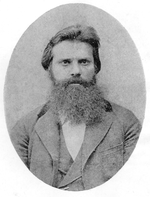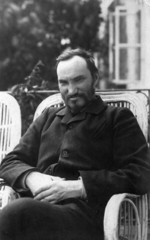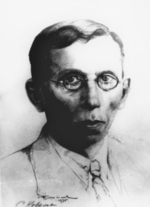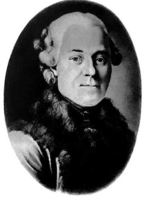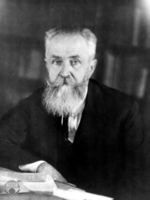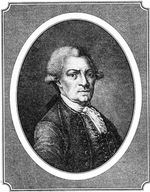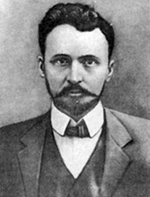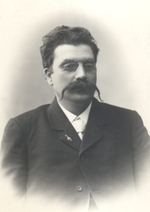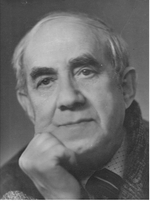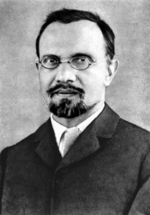Articles
Kotlyarevsky Aleksander (1837‒1881)
Kotlyarevsky Aleksander (1837‒1881) – specialist in Slavic studies and in literature, ethnographer.
In 1853, after a gymnasium in Poltava, K. enrolled at the Philological faculty of the Moscow University; there his supervisors were O. M. Bodiansky and F. I. Buslaev. In 1856, he got the golden medal for his work ‘What year did the Christening of Bulgarian take place?’. In 1857, he graduated from the university without Candidate degree because of his conflict with the lector in theology. In 1862, he got that Candidate degree at the St. Petersburg University for his thesis ‘On the time of accepting of the Christian Faith by Bulgarians, and the role of St Cyril of Thessaloniki (historical-chronological research)’. In 1857-1862, he wrote journalistic articles and critical reviews for newspapers and magazines, including ‘Otechestvennye zapiski’, ‘Moskovskoe obozrenie’, ‘Russkyi vestnik’, etc.; he taught at the Alexandrine Orphan Cadets Corps and some other schools.
Read More
Kotlyarevsky Sergey (1873–1939)
Kotlyarevsky Sergey (1873–1939) – historian, specialist in legal theory, social activist.
In 1896, he graduated from the Historical and Philosophical Faculty of the Moscow University; since 1900, he was Ass. Docent at the Chair of World History. In 1904, he defended his Doctor thesis ‘Lamennais and the Newest Catholicism’. He was at the roots of the shaping of the Constitutional Democratic Party; since 1905 – in its Central Committee. Deputy of the I State Duma. In 1906, K. Participated in the foundation of the Masonic lodge ‘Restoration’ in Moscow. Having passed through exams of the Legal Faculty of the Moscow University (by correspondence), in 1907, he defended his Master thesis in Jurisprudence ‘Constitutional State: Experience in Political and Morphological Review’; and in 1909 – his Doctor thesis ‘Legal State and Foreign Policy’.
Read More
Kovalev Sergey (1886–1960)
Kovalev Sergey (1886–1960) – historian of Classical society.
In 1908, he enrolled at the Physical and Mathematical Faculty of the St. Petersburg University. Two years later, he transferred at the Historical and Philological Faculty. In 1915, he went to the military service, not graduating from the university; in 1919-1938, he served at the red Army, and was involved into political propaganda. In 1922, staying at the military service, he graduated from the Petrograd University. In 1920, at the foundation of the Tolmachev Red Army University (later – Lenin Military-Political Academy) he became Dean, and then Rector; at the Military-Political Academy he worked till 1938, in parallel with other activities.
Read More
Kozitsky Grigory (1724–1775)
Kozitsky Grigory (1724–1775) – writer, journalist, State Secretary of Catherine the Great.
After the Kievan Mogialyanskaya Academy, he kept his studies at the University of Leipzig. He knew well Latin, Greek, French, and German languages. Since 1756, he taught at the Academic Gymnasium in St. Petersburg. He wrote articles for magazines ‘Trudoliubivaya pchela’ (Laborious Bee), ‘Vsyakay vsyachina’ (Sundries; he was, possibly, the Chief Editor of that weekly magazine since 1769). Since 1758, he made lectures in philosophy and literary disciplines at the Ac. of Sc., later he became Academic Councilor. Since 1765, he served at the court of Catherine the Great – as an Assistant, later as the State Secretary.
Read More
Krachkovsky Ignatius (1883–1951)
Krachkovsky Ignatius (1883–1951) – specialist in Arabic studies, one of the founders of the Soviet school of Arabic studies.
In 1901-1905, he studied at the Faculty of Oriental Languages of the St. Petersburg University, at the Arabic-Persian-Turkish-Tartar Department; he studies Arabic language and literature at the classes of A. E. Schmidt, N. A. Mednikov, V. R. Rosen; historical disciplines – at V. V. Bartold, Persian language – at V. A. Zhukovsky, Turkish language – at P. M. Melioransky, Ethiopian language, history and literature – at B. A. Turaev. He got the golden medal for a composition in Arabic literature ‘The Reign of Caliph al-Mehdia’. In 1908-1910, he was sent by University to Syria and Egypt. Later, he described his travels in the book ‘Over the Arabic Manuscripts’.
Read More
Krasheninnikov Stepan (1711‒1755)
Krasheninnikov Stepan (1711‒1755) – Russian discoverer of Kamchatka.
He was born in Moscow, in a soldier’s family; studied at the Slavic-Greek-Latin Academy (1724-1732), and at the St. Petersburg University (1732-1733). In 1733-1736, he participated in the Second Kamchatka expedition (1733-1743) as an assistant of Academicians J. Gmelin and G. Miller. In 1737-1741, K. travelled to Kamchatka by himself, studying the nature and the people of the peninsula. In 1745, he became Adjunct of the Ac. of Sc.; and in 1750 – Professor. In 1750, he was elected for Rector of the Academic University, and Inspector of the Academic Gymnasium.
Read More
Krasikov Petr (1870–1939)
Krasikov Petr (1870–1939) – Soviet party and state activist, author of numerous publications on various issues of religion and atheism.
He graduated from the legal Faculty of the St. Petersburg University by correspondence; since 1892, he participated in the revolutionary activity; was arrested as a member of the Communist Party, spent some time in a single camera of the St Peter and Paul Fortress, was sent to exile. After the October Revolution 1917, he actively participated in building the Soviet policy in the field of relations between State and Church, he was a member of the commission for working out the Decree on Separation of Church from State, and School from Church; in 1922-1924, he headed a department of the Narkomat of Justice which fulfilled that Decree and put it into life, coordinated central and local state institutions, prepared legal acts, etc.
Read More
Krasnozhen (Krasnozhen-Didenko) Mikhail (1860 – 1941)
Krasnozhen (Krasnozhen-Didenko) Mikhail (1860 – 1941) – lawyer, historian of canonic law.
In 1881, after a gymnasium in Kaluga, he enrolled at the Legal Faculty of the Moscow University, where he studied canonic law under the supervision of A. S. Pavlov (1832-1898). In 1889, he was sent by the Ministry of Education for studies in libraries of Wien, Rome, Florence, and Munich. In 1892, he became Ass, Docent at the Legal Faculty of the Moscow University and made lectures in canonic law; since 1893, he was Professor of the Chair of Canonic Law at the Yuriev University (Dorpat/Tallinn). He took part in the foundation of the first Russian Research and Literary Society at the Yuriev University, the Society for the Support of Students in Need; he was also Deputy Chairman of the Russian Public Library in Yuriev, churchwarden of the University Orthodox church, honourary magistrate of the Yuriev-Verr Court Distirct.
Read More
Kreinovich Erukhim (Erokhim, Eugeny, Yury) (1906‒1985)
Kreinovich Erukhim (Erokhim, Eugeny, Yury) (1906‒1985) – linguist and ethnographer.
In 1926, he graduated from the Ethnographical Department of the Geographical Faculty of the Leningrad University, where he passed through the courses of L. Ya. Schternberg on religious beliefs. V. G. Bogoraz recommended him to study Nivkhs (Gilyaks).
In 1926-1928, he worked on Sakhalin as school teacher, taught adult Nivkhs to read and write, got a position of representative in native affairs from the Presidium of the Revolutionary Committee of Sakhalin; at the same time, he collected ethnographical material. Since 1935, he was Senior Researcher of the Institute of the peoples of the North, Head of the Group of Paleoasiatic languages. In 1929-1931, he was also Researcher at the Museum of Anthropology and Ethnography.
Read More
Krymsky Agaphangel (1871–1942)
Krymsky Agaphangel (1871–1942) – historian, orientalist, specialist in Turkish and Semitic studies.
In Moscow Arabic studies of the early twentieth century K. played the same role, as V. V. Rosen a quarter of century before in St. Petersburg.
He graduated from the Special Classes of the Lazarev Institute of Oriental Languages (1889-1892), and the Slavic-Russian Department of the Historical and Philological Faculty of the Moscow University (1892-1896). After it, he was sent to Syria for two years (1896-1898); he returned with rich material in Arabic folklore, which laid in the foundation of his further lectures at the Lazarev Institute. In Syria K. developed his knowledge in speaking Arabic and Arabic dialects, he wrote articles for Arabic research magazines.
Read More
Showing 131-140 of 351 items.

